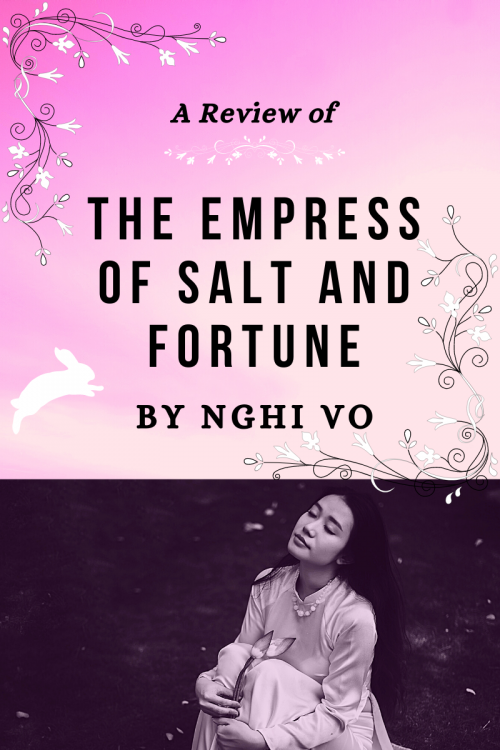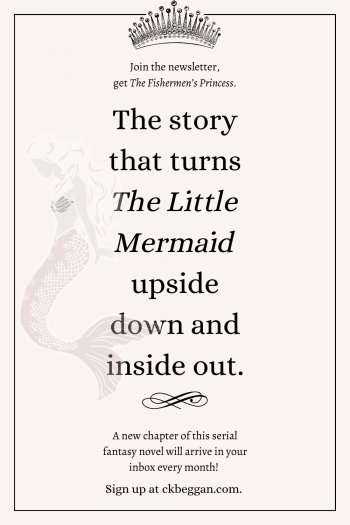
“The Empress of Salt and Fortune belongs to all her subjects, and she was romantic and terrible and glamorous and sometimes all three at once. There are dozens of plays written about her, and some are good enough that they may last a little while even after she is gone. Older women wear their hair in braided crowns like she did, and because garnets were her favorite gem, they are everywhere in the capital.
“In-yo belonged to Anh, but Thriving Fortune only belonged to us.”
– Rabbit, telling her story to Cleric Chih and Almost Brilliant
If you read any book this month, let it be The Empress of Salt and Fortune. It won’t take long. This beautifully written, surprisingly short book is as tidy as cleric Chih’s records, and as wonderful and heartbreaking as the story of the Empress of Salt and Fortune herself.
The writing leans toward prose (lovely, fast-moving prose), the ending is a bit abrupt, and I felt one of the key emotional moments in The Empress of Salt and Fortune was a bit too underplayed. Yet reading over the ending and some of my highlights, I feel that same heartache the story left me with all over again. I’m happy to overlook my grumblings about those things, and I think many other readers will be, too, precisely because of that writing and the emotional punch it carries.
“…You could also find a beauty in it, a kind of peace even in something that was at first so very unsettling. I’d cried the first time I saw the luminescence of the lake. Now most nights, I slept on the porch, bathed in its red glow. If it was a monster of some kind, it was a monster that watched over me, and, at the very least, it had not devoured me yet.”
– Rabbit, on Lake Scarlet
The Empress of Salt and Fortune is a story full of uncommon elements. The opening chapter is packed with world-building, without pausing to explain it; protagonist Chih is in a hurry, after all. Instead of grand battle scenes in this tale of revolution, there a plot twists. The title character appears only once as a ghost, treated reverently by other ghosts on a road, and Chih, who is at first mistaken for a girl by part-time narrator Rabbit, is a cleric from the abbey at Singing Hills and not a girl. In the world of The Empress of Salt and Fortune, clerics, who are charged with traveling the world to record its history and events and locations, are they and them.
Throughout the book, chapters often begin with Chih and Almost Brilliant’s inventory of the house at Lake Scarlet, the sarcastically named Thriving Fortune. This is part of Chih and their neixin companion’s work. “The abbey at Singing Hills would say that if a record cannot be perfect,” Chih tells Rabbit, the now-elderly servant she meets there, “it should at least be present. Better for it to exist than for it to be perfect and only in your mind.” Pride drives Chih on this detour to the newly declassified Lake Scarlet; she desires to be the first cleric to record Thriving Fortune’s details. “Welcome to your place in history, grandmother,” Chih tells Rabbit as the now-elderly woman begins her story.
And that story matters a lot, because of its famous former resident.
In-yo, the Empress of Salt and Fortune, and Rabbit meet in the capital, where Rabbit is a palace servant and In-yo has become the new wife of the emperor. As a northerner, from a country known for mammoths and being bullied by Anh, In-yo is ill at ease in the south, where mages keep winter at bay and mammoths can’t survive. She isn’t well-received, either. The ladies and servants of the court fear her at first, “because the women of the north were all thought to be witches and sorceresses. Then [the noble ladies] discovered her great secret, that she was only a heartbroken and lonely girl, and she became of no account at all.”
Though In-yo is exiled to Thriving Fortune after producing an heir, clearly she plays a long game. The beginnings of the revolution trickle into the story with details not even Rabbit, devoted to the Empress as she is, could make sense of at the time. In-yo is a complex character, seen only through the eyes of others but depicted sympathetically and unflinchingly by Rabbit. In The Empress of Salt and Fortune, revolution is told through relationships rather than battles.
There is more to Rabbit herself, too. “For a single faraway moment, she looked like something other than a simple servant woman, but it was there and gone so fast that Chih could not say for sure what it was.” Naturally, Rabbit is more entwined with history than anyone knows. She suffers for her association with In-yo, and without it, too.
Rabbit’s life with In-yo is also easier and less formal than at court. There are fewer risks, too, for many of the years they reside there. But later experiences that could have left her bitter and angry never affect the choices she makes, though they leave her feeling worn and older than her years. She’s an understated, constant and lovable presence in the story.
“She had a foreigner’s beauty, like a language we do not know how to read…her face was as flat as a dish and almost perfectly round. Pearl-faced, they call it where she came from, but piggish is what they called it here.” And “as far as In-yo was concerned, she had no equals in all the empire.”
– Rabbit on In-yo, the Empress of Salt and Fortune
Rabbit sums it up best, in one of her recollections, with one of the most quotable lines in the book (and there are quite a few): “One drunken evening, many years on, In-yo would say that the war was won by silenced and nameless women, and it would be hard to argue with her.” Alone at Thriving Fortune, having outlived the Empress and so many others but still carrying their secrets, Rabbit could easily have been one of those women without Chih’s arrival. It’s this sad reality that brings a quiet joy to Rabbit’s story of loss, revolution and betrayal.
The world-building of The Empress of Salt and Fortune is lightly sketched but creative. Rather than spend a lot of time on the details, key aspects are revealed in matter-of-fact conversation, from the glowing Lake Scarlet’s origin as the resting place of a dying star, to a carp that became a calico dragon, and the ghostly imperial palanquin that Chih encounters on the road to Thriving Fortune. There are hidden dangers from creatures we never quite see, and ghosts are omnipresent. It made me want to continue journeying with Cleric Chih and Almost Brilliant—and Vo’s beautiful writing—just to see more of it.
To learn more about this author, visit nghivo.com.


